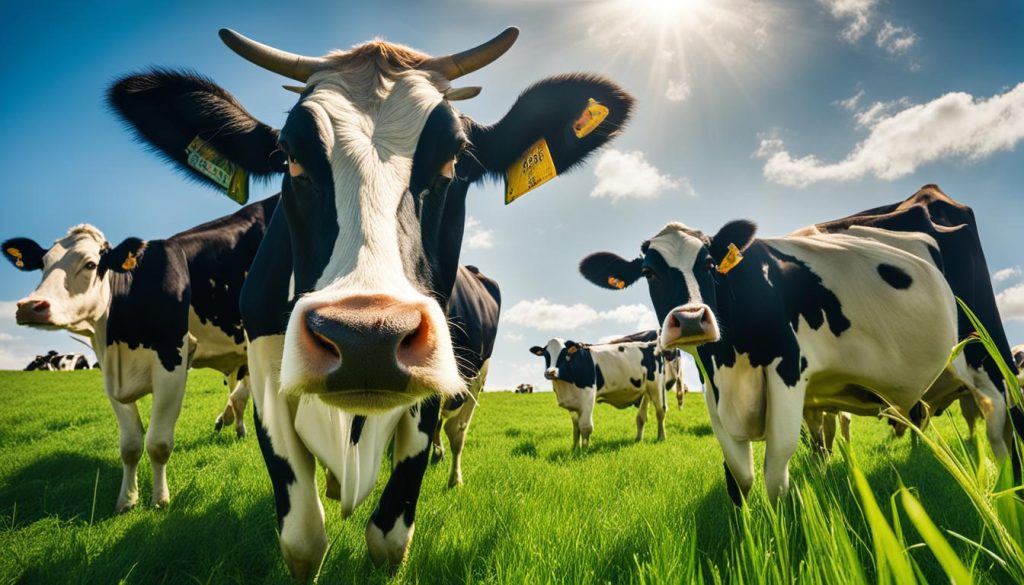When it comes to choosing dairy products, there are plenty of options available. However, if you’re looking for a healthier and more nutritious choice, grass-fed dairy is the way to go. Not only does it offer a multitude of health benefits, but it also supports sustainable farming practices and provides a delicious taste experience. Let us look further and learn more about the health benefits of grass fed dairy.
One of the major advantages of grass-fed dairy is its higher levels of beneficial fatty acids. Studies have shown that grass-fed cows produce milk that is significantly higher in omega-3 fatty acids and conjugated linoleic acid (CLA), a heart-healthy fatty acid. These nutrients have been linked to improved cardiovascular health and overall wellbeing.
Another reason to choose grass-fed dairy is the lower levels of omega-6 fatty acids. Consuming organic dairy products has been shown to lower dietary intakes of omega-6, which is important as an excessive intake of omega-6 can lead to inflammation in the body.
In addition to its nutritional benefits, grass-fed dairy also provides an alternative for consumers who are concerned about how and where their food is produced. By opting for grass-fed dairy, you are supporting sustainable agriculture practices and promoting biodiversity and soil health.
Overall, grass-fed dairy is a nutritious, sustainable, and delicious choice for individuals looking to optimize their diet and embrace a healthier lifestyle. The benefits of grass-fed dairy extend far beyond a simple food choice, making it a compelling option for both your health and the environment.
Health Benefits of Grass Fed Dairy
- Grass-fed dairy offers numerous health benefits due to its higher levels of beneficial fatty acids.
- Choosing grass-fed dairy can help lower dietary intakes of omega-6, which is important for reducing inflammation.
- Grass-fed dairy supports sustainable agriculture practices and promotes biodiversity and soil health.
- Consuming grass-fed dairy provides a delicious taste experience, thanks to cows’ natural diet of pasture and forage.
- By choosing grass-fed dairy, you are making a conscious and nutritious choice for your overall wellbeing.
What is Grass-Fed Milk?
Grass-fed milk, also known as “grassmilk,” is a dairy product that comes from cows fed a nearly 100 percent forage-based diet. This means that the cows primarily consume pasture during the grazing season and forage-based feeds, such as dried or fermented forages, during the non-grazing season.
Grassmilk offers several health advantages compared to conventional milk. One of the key benefits is its rich content of omega-3 fatty acids and conjugated linoleic acid (CLA). These beneficial fatty acids contribute to a healthier balance of fats in your diet, which can have positive effects on your overall health.
Including grass-fed dairy in your diet allows you to enjoy the nutritional benefits of these premium products. Grassmilk has been found to have higher levels of omega-3 fatty acids and CLA, compared to conventional milk. These nutrients provide numerous health benefits, such as supporting cardiovascular health and promoting a healthy inflammatory response in the body.
By choosing grass-fed dairy, you can take advantage of its positive impact on your health. Whether you enjoy a glass of grass-fed milk or incorporate grass-fed dairy products into your favorite recipes, you can feel confident about the nutritional value and health benefits they provide.
Effect of Grassmilk on Human Diets
When it comes to our diet choices, it’s important to consider the health benefits that certain foods can provide. By opting for dairy products from grass-fed cows, we can unlock a range of advantages that contribute to our overall well-being.
Research has shown that consuming dairy from grass-fed cows can have a significant impact on our dietary intake. Compared to conventional milk, grass-fed organic milk and dairy products offer a superior fatty acid profile that benefits our cardiovascular health. These products have a lower ratio of omega-6 to omega-3 fatty acids, which is essential for maintaining a healthy balance within our bodies.
By choosing grass-fed dairy, we can lower our dietary intake of omega-6 while increasing our intake of omega-3 and conjugated linoleic acid (CLA), a heart-healthy fatty acid. This shift has a positive influence on our overall health, supporting cardiovascular function and improving our well-being.
Including grass-fed dairy in our diets is a wise choice for those seeking to optimize their health. The health benefits of consuming dairy from grass-fed cows are significant, and the improved fatty acid profile found in grass-fed organic milk and dairy products sets them apart from conventional options. Let’s embrace the power of grass-fed dairy for a healthier future!
Grassmilk and Nutritional Value
Grass-fed dairy products, including milk and cheese, are incredibly nutritious. They are packed with essential nutrients, such as vitamins, minerals, and beneficial fatty acids. Grassmilk, in particular, stands out for its impressive nutritional profile and natural benefits.
One of the key advantages of grassfed dairy is its high levels of omega-3 fatty acids and CLA, or conjugated linoleic acid. These fatty acids have been linked to various health benefits, including improved heart health and reduced inflammation. Compared to conventional milk, grassmilk has been found to have higher levels of these beneficial fatty acids, making it an excellent choice for individuals looking to optimize their health.
Moreover, grass-fed dairy has a healthier fatty acid profile overall, with lower levels of omega-6 fatty acids. This is significant because the modern Western diet tends to be higher in omega-6 fatty acids, which can promote inflammation when not balanced with omega-3s. By consuming grass-fed dairy, you can help restore this balance, supporting your cardiovascular health and overall wellbeing.
In addition to fatty acids, grassmilk also provides a rich array of vitamins and minerals. These include calcium, vitamin B12, riboflavin, and phosphorus, among others. These nutrients are essential for maintaining strong bones, supporting energy metabolism, and promoting overall health.
The Nutrient-Rich Benefits of Grass-Fed Dairy
- Higher levels of omega-3 fatty acids and CLA
- Lower levels of omega-6 fatty acids
- Rich in essential vitamins and minerals
- Supports cardiovascular health
- Promotes overall wellbeing
By incorporating grass-fed dairy into your diet, you can enjoy the natural benefits of these nutrient-rich products, helping you maintain a healthy and balanced lifestyle.

Grassmilk and Sustainable Farming
Grass-fed dairy farming is at the forefront of sustainable agriculture practices. By raising cows on grass-based diets, farmers not only provide high-quality dairy products but also contribute to environmental preservation. Unlike cows fed concentrated feeds, those on grass-based diets have a lower carbon footprint, helping to reduce greenhouse gas emissions. This sustainable approach also promotes biodiversity and improves soil health, benefiting the entire ecosystem.
One of the key benefits of grass-fed dairy products is that they are free from synthetic hormones, antibiotics, and pesticides. This makes them a healthier and more natural choice for consumers concerned about the origin and safety of their food. By choosing grass-fed dairy, individuals can enjoy the nutritional benefits of dairy while minimizing their exposure to harmful substances.
Furthermore, grass-fed dairy has higher levels of omega-3 fatty acids, which are known for their various health benefits. Omega-3s are essential for brain health, heart health, and inflammation reduction. By including grass-fed dairy in their diets, individuals can increase their intake of these beneficial fatty acids.
Switching to sustainable grass-fed dairy farming not only benefits the environment but also contributes to the health and well-being of consumers. By supporting farmers who prioritize ethical and eco-friendly practices, individuals can make a positive impact on the world while enjoying the nutritious and delicious products that grassmilk has to offer.
The Benefits of Grass-Fed Dairy Farming:
- Reduced carbon footprint compared to concentrated feed-based farming
- Promotes biodiversity and improves soil health
- Free from synthetic hormones, antibiotics, and pesticides
- Higher omega-3 fatty acid content
Grassmilk and Financial Benefits for Farmers
Switching to grass-fed dairy production can bring significant financial advantages for farmers. By shifting towards a diet that relies more on pasture and forages, farmers can effectively lower costs by reducing expenses associated with purchasing grains and concentrates.
Grass-based diets for cows prove to be more cost-effective compared to traditional feeding methods. In addition to reducing feed expenses, grassmilk production can lead to increased profitability for dairy farmers. Embracing sustainable grass-based farming systems not only optimizes their financial success but also allows them to provide consumers with high-quality, nutritious dairy products.

Grassmilk and Taste
Grass-fed dairy products offer more than just health benefits – they also provide a delightful taste experience. The cows’ natural diet of pasture and forage gives grass-fed milk and cheese a distinctive flavor profile that sets them apart from conventional dairy products.
Unlike cows that consume concentrated feeds, grass-fed cows produce milk with a unique, creamy taste that is rich in natural flavors. The use of organic farming practices further enhances the overall taste and quality of grass-fed dairy products, as no synthetic additives or chemicals are used.
Consumers who appreciate the extraordinary flavors of organic and grass-fed products often choose them for their superior taste and the satisfaction of knowing they are enjoying natural, wholesome dairy products. The pure and unadulterated taste of grass-fed milk and cheese can elevate any culinary experience and add a touch of authenticity to various dishes and recipes.
If you are looking for dairy products that not only support your health but also offer a truly indulgent sensory experience, organic grass-fed dairy is the way to go.
Conclusion
If you’re looking to optimize your health and well-being, grass-fed dairy is a fantastic choice. The importance of grass-fed dairy for health cannot be overstated, as it offers numerous benefits that can help you achieve your wellness goals.
One of the key advantages of grass-fed dairy is its higher levels of beneficial fatty acids. Compared to conventional dairy, grass-fed dairy is lower in omega-6 fatty acids and higher in omega-3 fatty acids and conjugated linoleic acid (CLA). This improved fatty acid profile can have a positive impact on cardiovascular health and overall nutrition.
Not only is grass-fed dairy beneficial for your health, but it also promotes sustainable farming practices. Cows raised on grass-based diets have a lower carbon footprint and contribute to biodiversity and soil health. By choosing grass-fed dairy, you not only support your own well-being but also the environment.
Additionally, the natural and delicious flavors of grass-fed dairy products are a delightful bonus. The cows’ natural diet of pasture and forage gives grass-fed milk and cheese a unique taste that many consumers find irresistible.
So why not make the switch to grass-fed dairy? By choosing these premium products, you can enjoy the health benefits, support sustainable farming, and relish in the natural flavors of these nutritious and delicious dairy options.
FAQ
What are the health benefits of consuming grass-fed dairy products?
Grass-fed dairy products offer numerous health benefits, including higher levels of beneficial fatty acids, lower levels of omega-6, and an improved fatty acid profile. They are rich in essential nutrients, such as vitamins, minerals, and heart-healthy fatty acids like omega-3 and CLA. Grass-fed dairy products promote cardiovascular health, support overall wellbeing, and provide a nutritious addition to your diet.
Why should I choose grass-fed dairy over conventional dairy?
There are several reasons to choose grass-fed dairy. Grass-fed dairy products, such as milk and cheese, have a more favorable fatty acid profile, with higher levels of beneficial omega-3 fatty acids and CLA. They are also free from synthetic hormones, antibiotics, and pesticides. Grass-fed dairy farming promotes sustainable agriculture practices, and the natural, wholesome flavors of these products are often preferred by consumers.
How does grass-fed dairy contribute to a healthy diet?
Grass-fed dairy, produced by cows fed a nearly 100 percent forage-based diet, provides a healthier balance of fatty acids compared to conventional dairy. It’s rich in omega-3 fatty acids and CLA, which have been shown to have a positive impact on cardiovascular health and overall wellbeing. By choosing grass-fed dairy, you can optimize your diet and enjoy the health benefits of these nutritious products.
What is the nutritional value of grass-fed dairy?
Grass-fed dairy products, such as milk and cheese, are highly nutritious. They are rich in essential nutrients, including vitamins, minerals, and beneficial fatty acids. Grass-fed dairy has been found to have higher levels of omega-3 fatty acids and CLA compared to conventional dairy. These nutrients offer various health benefits, making grass-fed dairy an excellent choice for individuals looking to optimize their nutrition.
How does grassmilk promote sustainable farming?
Grass-fed dairy farming is a sustainable agricultural practice. Cows raised on a grass-based diet have a lower carbon footprint compared to those fed concentrated feeds. They also contribute to biodiversity and soil health. By choosing grass-fed dairy, you support environmentally friendly farming practices that benefit the planet and promote sustainable agriculture.
Can switching to grass-fed dairy lower costs for farmers?
Yes, switching to grass-fed dairy production can lower costs for farmers. By relying more on pasture and forages, farmers can reduce expenses associated with purchasing grains and concentrates. Grass-based diets for cows are more cost-effective and can lead to increased profitability. Embracing sustainable grass-based farming systems allows dairy farmers to optimize their financial success while providing consumers with high-quality, nutritious dairy products.
How does grassmilk taste compared to conventional dairy?
Grass-fed dairy has a distinct taste compared to conventional dairy. The cows’ natural diet of pasture and forage imparts a unique flavor profile to grass-fed milk and cheese. The use of organic farming practices enhances the overall taste and quality of grass-fed dairy products. Consumers who enjoy the natural, wholesome flavors of organic and grass-fed products often prefer them for their superior taste and health benefits.
What are the overall benefits of grass-fed dairy?
Grass-fed dairy offers numerous health benefits due to its higher levels of beneficial fatty acids, lower levels of omega-6, and improved fatty acid profile. It is a sustainable and nutritious choice for individuals looking to optimize their diet and overall wellbeing. By choosing grass-fed dairy, you support environmentally friendly farming practices and enjoy the natural and delicious flavors of these premium products.




